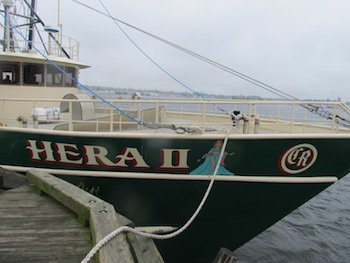Last week the Northeast fishing community was abuzz after New Bedford’s scallop king and “Codfather” Carlos Rafael was arrested and charged with corruption.
Everyone in New England fisheries knows the name Carlos Rafael and recognizes his fleet of cash-colored boats, emblazoned with CR on the bow. When scallop quotas went to an IFQ system, Rafael invested in the bulk of New Bedford’s lot. He was the right guy at the right time.
The 81-foot scalloper Hera II emblazoned with Carlos Rafael's initials and tied up in New Bedford, Mass.But the boon of Northeast scallops was not Rafael’s problem. He also owns a considerable amount of quota (and nearly 80 percent of the New Bedford boats) in the Northeast groundfish sector system. In that fishery, like every other permit holder, he was working within the increasingly problematic confines of sector quotas, or IFQs.
Unfortunately for Rafael, his bookkeeper and the rest of the groundfish industry, he’s been accused of conspiring to mislabel fish as a fraudulent end-run around quota management. Rafael was both boat owner and seafood broker, allegedly buying fish from his own boats, labeling some of the low-quota premium species as haddock and other abundant stocks, and then selling them for cash at the premium price of the correct species.
But this is not simply a story about fishing conspiracy and mislabeling. This is about money, power and a management system that left the back door propped open.
Any industry is susceptible to corruption, and the lack of permit caps is the Achilles heel of the groundfish quota system. Consolidation can put too much power in the hands of a single decision-maker. If permit caps had been a part of the sector management amendment, then Rafael would not have employed the bulk of the Massachusetts groundfish fleet. Each captain who allegedly colluded with him would have been independent business owners and would have had to conspire to commit fraud individually rather than cooperating as his employees. That doesn't make fraud impossible, but it makes it less likely.
Rafael himself railed against the rest of the groundfish fleet's lobbying effort to establish permit caps. That was the prop holding the back door open, and they knew it. He was the wrong guy at the right time.
None of the alleged crimes is justifiable or excusable. This case will cast a pall over all of the honest fishermen who stuck to their quotas, despite their lack of faith in the data. The scope and breadth of the charges against Rafael reflect poorly on the entire industry. Some say he kept the groundfish industry running in Massachusetts, and that may be true. But at what cost?
I hope this isn't the death knell of the Northeast groundfish fleet. I hope we will use this as an opportunity to take a hard look at the management gaps as well as the culture of this fishery. Mistrust in the data and federal assessments based on that data is a pervasive and persistent problem. The Northeast Fisheries Science Center is now making genuine efforts to address the failings of many years of flawed data collection. But until the managers have a history of compiling fair and accurate data on which to make their assessments, the fishermen will have little trust in the process.
Some pro-monitoring groups pounced immediately on the notion that Rafael’s arrest proves the need for stricter monitoring on fishing boats, despite the fact that the alleged fraud could have been prevented at the dock. You don’t have to monitor every boat if you set up the system for success and tighten the loopholes.
• Mandating permit banks and quota caps is the very least we can do to make sure more people have the chance to make a fair and honest living under quota management systems.
• Allow fishermen to land discards to be donated to food banks, schools and federal food-service agencies without it counting against their personal quota. You can most accurately (and safely) count fish when they’re all being landed at the dock.
• Reallocate federal funds from on-board monitoring to dockside monitoring and better data collection.
• Make cooperative research mandatory under Magnuson for every federally monitored species that is classified as overfished or undergoing overfishing and ensure that that data is incorporated it into an annual assessment.
Last January, Canada’s Cooke Aquaculture was in talks to buy Rafael’s 12-boat New Bedford scallop fleet. When asked how he would manage to sell to an international company, despite a 25 percent consolidation limit, Rafael replied, “Forget about it. This is America; anything can happen, with money behind it.”
Let's put our money where it counts get behind better management that can help this fishery find a future.







